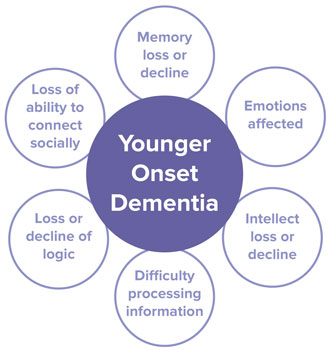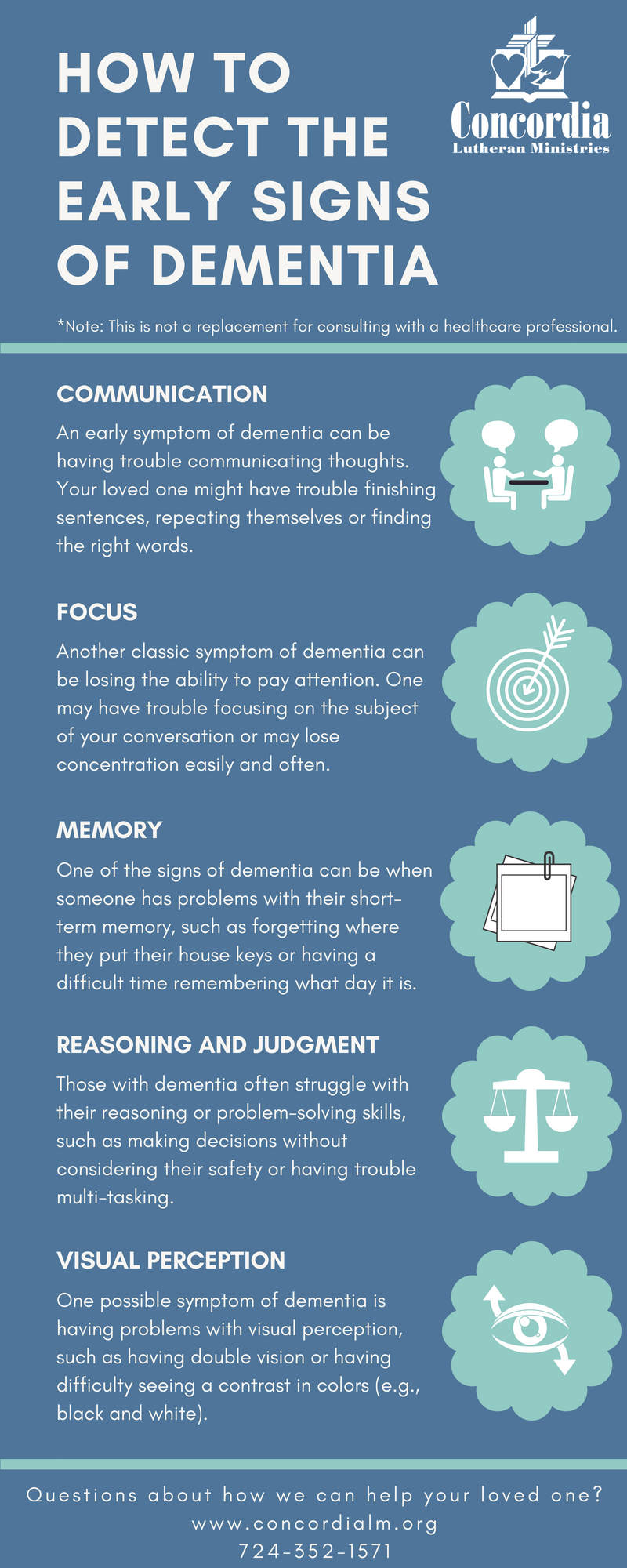Is There Hope for a Cure for Frontotemporal Dementia?
Is There Hope for a Cure for Frontotemporal Dementia?
Blog Article
The Value of Early Detection and Diagnosis in Mental Deterioration Situations
When it comes to mental deterioration, identifying the signs early can make a substantial distinction. Comprehending the subtleties of dementia can assist you identify symptoms faster.
Understanding Mental Deterioration: Kinds and Signs

Common symptoms include amnesia, trouble with communication, and modifications in mood or actions. You could see a person having problem with acquainted jobs or becoming puzzled regarding time and area. If you see these check in on your own or a liked one, do not think twice to seek aid. Early recognition of dementia symptoms can significantly boost the overall management of the problem, making it vital to stay notified. When essential., recognizing these distinctions empowers you to act quickly and properly.
The Effect of Early Diagnosis on Therapy Alternatives
Recognizing the indicators of dementia early can noticeably affect the therapy alternatives available. You open up the door to a variety of therapies that can slow down the disease's progression when you seek a medical diagnosis without delay. Drugs created to manage signs are most effective in the earlier stages. You'll additionally have much better access to clinical tests, which may provide sophisticated treatments that aren't readily available later on in the condition.
Additionally, very early medical diagnosis enables you to explore non-pharmaceutical approaches, such as cognitive treatments and way of living changes, that can improve cognitive function. This proactive strategy not only empowers you however also helps in managing possible existing side-by-side conditions.
Exactly How Very Early Discovery Can Improve Lifestyle
Early discovery of dementia not only opens up treatment choices yet also greatly improves your lifestyle. When you determine symptoms early, you can start to handle them effectively, allowing you to keep a feeling of independence and control over your daily activities. Early medical diagnosis suggests you can access therapies and way of living modifications tailored to your needs, assisting you handle difficulties in a much more organized way.
Additionally, comprehending your condition equips you to make informed decisions concerning your future. You can prepare for the modifications ahead, making certain that your personal goals and preferences are focused on. This aggressive technique promotes a complacency, minimizing anxiety for both you and your enjoyed ones.
Moreover, taking part in early interventions might improve your cognitive function and emotional wellness, permitting you to delight in significant connections and experiences. In brief, very early detection isn't practically managing signs; it's regarding enriching your life.
The Function of Household and Caregivers in Very Early Recognition

By sharing your worries, you assist start very early evaluations, which can result in prompt diagnosis and intervention. Furthermore, your assistance can urge loved ones to look for help, decreasing stigma and worry connected with dementia.
In addition, maintaining open lines of communication within the family fosters an encouraging atmosphere. Early Onset Dementia. Your aggressive participation not only aids in recognizing the issue however likewise assists in preparing for future treatment, guaranteeing that your loved one obtains the ideal feasible assistance as their demands evolve
Usual Misunderstandings About Dementia
Family caretakers and members often face obstacles not just in determining signs of mental deterioration however likewise in going across the misconceptions bordering the condition. One usual misconception is that dementia only affects the senior. While age is a significant danger variable, younger people can also create mental deterioration. One more myth is that dementia is a typical component of aging. It is essential to acknowledge that while amnesia can happen with age, it's not an unavoidable end result. Some people think dementia just affects memory, however it can also affect habits, reasoning, and mood. Furthermore, numerous assume that as soon as detected, absolutely nothing can be done. Actually, very early intervention can lead to better administration of signs. Ultimately, some think that all sorts of mental deterioration coincide. Each kind, such as Alzheimer's or vascular mental deterioration, has unique attributes and requires various strategies to care. Recognizing these false impressions is essential for reliable assistance.
Tools and Analyses for Very Early Detection
When it comes to very early discovery of dementia, recognizing cognitive analyses and testing devices is important. These devices can aid you recognize prospective issues before they escalate. By acquainting on your own with these evaluations, you can play an active role in monitoring cognitive health.
Cognitive Assessments Summary
Cognitive evaluations play a vital duty in the early detection of dementia, as they help identify refined changes in memory, assuming, and thinking abilities. These analyses commonly consist of a series of standard tests that evaluate different cognitive functions. By participating in these examinations, you can acquire useful understandings into your cognitive health. Typical assessments may involve jobs connected to attention, language, analytic, and recall. They're typically carried out by healthcare professionals trained to analyze the results precisely. Early recognition with these devices can cause timely interventions, boosting end results and quality of life. Seeking out these assessments can be a proactive action toward my site understanding and managing your mind health effectively. if you see any type of cognitive changes.
Evaluating Devices Application
Using reliable screening tools is necessary for the very early discovery of mental deterioration, as they use a structured approach to reviewing cognitive health and wellness. Usual assessments, like the Mini-Mental State Evaluation (MMSE) or the Montreal Cognitive Evaluation (MoCA), help identify memory deficiencies and various other cognitive problems. Bear in mind, early discovery can considerably impact treatment choices and high quality of life, so don't ignore the power of proactive screening.
Actions to Take After a Diagnosis: Preparation for the Future
After receiving a dementia diagnosis, it's important to begin preparing for the future. You'll intend to develop care plans that match your demands while also addressing legal and economic preparations. Taking these steps early can help guarantee you and your loved ones really feel much more protected progressing.
Developing Care Plans

Economic and lawful Preparations
As you navigate your care strategy, it is necessary to contemplate the financial and lawful elements of coping with dementia. Start by assigning a power of attorney to manage your monetary choices if you're incapable to do so. This assures your desires are appreciated and can alleviate the worry on your loved ones. Next, think about producing a this content living will to outline your health care choices. Review your insurance policy policies and comprehend what's covered, specifically long-term treatment choices. It's also a good idea to consult with a financial coordinator knowledgeable about dementia-related issues. They can help you handle your possessions and plan for future expenditures. Taking these positive steps can give tranquility of mind and assure your needs are click here for more info satisfied as your problem proceeds.
Often Asked Questions
What Are the Risk Elements for Creating Mental Deterioration?
You could encounter higher risks for developing dementia if you have a household background, cardiovascular concerns, diabetes, smoking routines, or reduced education levels. Remaining active emotionally and literally can help in reducing these risks substantially.
Can Way Of Living Changes Prevent or Delay Dementia?
Yes, making way of living changes can aid protect against or delay dementia. By staying active, eating a well balanced diet, taking part in social activities, and testing your mind, you're enhancing your cognitive wellness and reducing danger aspects.
How Does Dementia Differ From Normal Aging?
Dementia includes cognitive decrease that disrupts life, while regular aging commonly doesn't (Frontotemporal Dementia). You could notice memory lapses as you age, however mental deterioration signs, like confusion and problem with communication, are more serious and disruptive
Are There Any Support System for Mental Deterioration Caregivers?
Yes, there are support system for dementia caregivers. You can locate neighborhood or on-line groups through companies like the Alzheimer's Organization. Getting in touch with others in similar situations can provide valuable psychological assistance and functional recommendations.
What Legal Documents Should I Prepare After a Mental Deterioration Medical Diagnosis?
After a dementia diagnosis, you need to prepare vital lawful files like a power of attorney, healthcare proxy, and living will. These aid ensure your wishes are respected and provide advice for future medical and economic choices.
The Value of Very Early Detection and Medical Diagnosis in Dementia Cases
Alzheimer's disease is the most typical form, yet you'll likewise experience vascular dementia, Lewy body mental deterioration, and frontotemporal dementia.When it comes to very early detection of mental deterioration, understanding cognitive analyses and screening devices is crucial.Cognitive evaluations play a vital role in the very early detection of dementia, as they aid determine refined changes in memory, assuming, and reasoning skills.Making use of effective testing tools is necessary for the early discovery of dementia, as they use an organized method to reviewing cognitive health and wellness.
Report this page